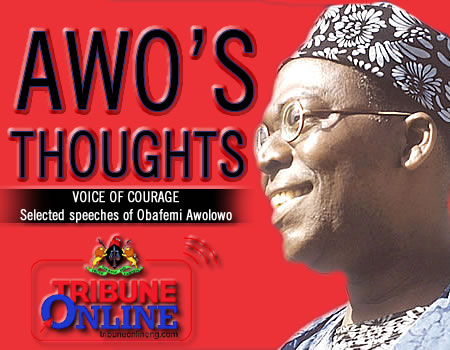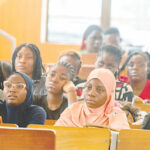CONTINUED FROM LAST WEEK
A speech on the Appropriation Ordinance given in the House of Representatives. Lagos, on 15th March. 1952.
For purpose of clarity I would like to say at the very outset that whenever I refer to the revenue of Nigeria in the course of my speech I make reference to the revenue derived locally exclusive of the Colonial Development and Welfare grants, that is to say I would like to be understood as referring to the sum of £38,450, 150 shown at page 10 of the draft Estimates. Sir, it appears to be common ground, for His Excellency the Governor himself and the Honourable the Financial Secretary have laid emphasis on the fact, that the economy of Nigeria is not balanced. A cursory examination of Some Portions of the revenue estimate will give support to his particular statement. I refer Honourable Members to pages 10 and 11 of the draft Estimates where it will be seen that the revenue from Customs duties, that is import and export duties, are respectively EI4,595,400 and £8,500,000. The total of these two sources of revenue amounts to £23,095,400 altogether amounting to 60½ per cent of the total revenue of the country. Then if you look at page 11 you will find that revenue from Company’s tax amounts to £4½ million. The total of the Customs duties and the revenue accruing from Companies’ tax therefore amounts to £27,345,000, altogether about 71per cent of the total revenue of the country.
Individuals’ Income Tax amounts to only £750,000 – that is about 2 per cent of our total revenue.
I believe it is plain to all of us in this Honourable House that the Companies in this country derive their profits and prosperity from export and import trade and it follows, therefore, that they are mostly dependent on overseas trade. When you bear in mind that the aggregate total of the revenue accruing from export and import duties and from Companies’ tax, are dependent on foreign and overseas markets, you will see that any slump in the overseas market in regard to export commodities would be bound to be reflected in these three sources of revenue that I have mentioned. They will in short injuriously affect those sources of revenue to the extent that they would be reduced considerably. There is no doubt that a slump in the market in regard to our export commodities would reduce export duties; correspondingly import duties will fall, and at the same time revenue accruing from profits made by companies will also fall. If I may make a comparison in order to clinch the point which has been made not only by me but by His Excellency and the Honourable the Financial Secretary, that the economy of the country is unbalanced.
In the United Kingdom the revenue from Customs duties forms only 2 I per cent of the total revenue of the country and the revenue from income tax which may be regarded as analogue to our individual income tax amounts to 37 per cent of the total revenue of the country. You will see, therefore, that the revenue of the United Kingdom is not so dependent on external circumstances as our revenue.
It does not therefore, Mr. President, require the wisdom of Solomon or the analytical mind of an economist to realise that the economy of Nigeria is unbalanced. But what do not appear to be realized by most people are the underlying causes of this state of unbalance. I’d like to say in passing that the Honourable the Financial Secretary merely repeated the obvious when he asserted in the course of his long but able speech that ‘Nigeria is poor’ and that ‘we are resolved to make a determined attack .on the poverty of this country’.
But what are the causes of Our poverty? There is no answer to this question in the speech of the Honourable the Financial Secretary, and therefore I may be permitted to enumerate very briefly what I consider to be the underlying causes of the poverty of our country. In my humble opinion the causes of our poverty are: the abject state of the peasant class of this country, their inertia through want of health, their enslavement by ignorance and superstition, their antediluvian methods of cultivating the land and the progressive deterioration of the fertility of the land due to bad husbandry, and also their hopelessly unorganized system of marketing their farm products.
Statistics are not available on the point, but I think I would not be far wrong if I were to estimate our peasant class to be about 90 per cent of the total population of this country. Again in my humble opinion, the immediate cure, knowing the causes, then would firstly be a large scale improvement in the agricultural economy of this country by means of the introduction of scientific and modem methods of cultivating the land, so as thereby to improve the productivity and the earning capacity of our peasant class. I have no doubt that this method alone will reflect itself in the Source of revenue which is put down here as individual income tax.
Secondly, I believe that these underlying causes can be removed by the introduction of mass education so that there may be freedom from ignorance and superstition.
Thirdly, there must be a substantial and extensive provision of medical and social services so that our people may have a Sound body for a sound mind and be able to enjoy life more abundantly.
I do not at all pretend that these formulae that 1 have just enunciated are simple to carry out, and I would like to say also that I do not at all subscribe to the view that Nigeria’s economy can be improved only by developing our agricultural economy to the maximum.
I share the view that side by side with the improvement in agricultural economy there should be a measure of industrialization. But my view about industrialization of this country is not by issuing invitation to foreigners to come into this country to exploit its resources, but by allowing Africans or rather, I prefer to use the word ‘Nigerians’, because I hear Dr. Malan also calls himself an African, to embark upon the industrialization of this country, and Government giving such Nigerians every help that is within its power to give.
CONTINUES NEXT WEEK
READ ALSO FROM NIGERIAN TRIBUNE
WATCH TOP VIDEOS FROM NIGERIAN TRIBUNE TV
- Let’s Talk About SELF-AWARENESS
- Is Your Confidence Mistaken for Pride? Let’s talk about it
- Is Etiquette About Perfection…Or Just Not Being Rude?
- Top Psychologist Reveal 3 Signs You’re Struggling With Imposter Syndrome
- Do You Pick Up Work-Related Calls at Midnight or Never? Let’s Talk About Boundaries







